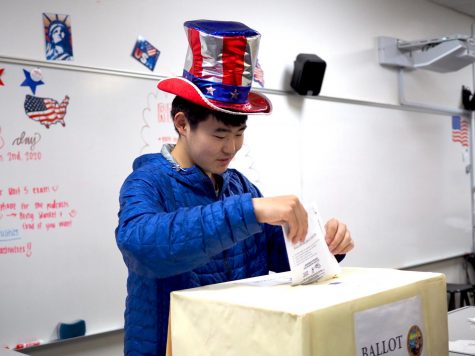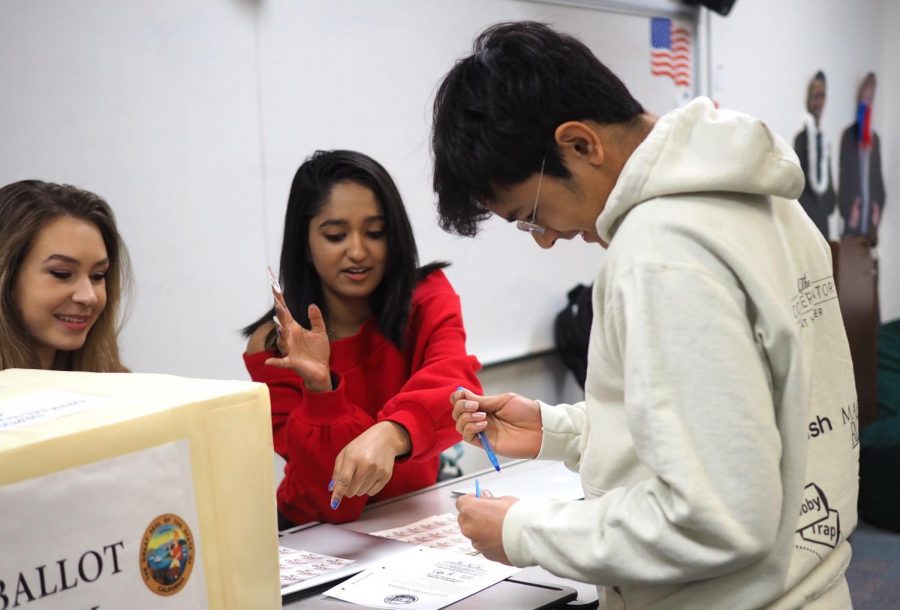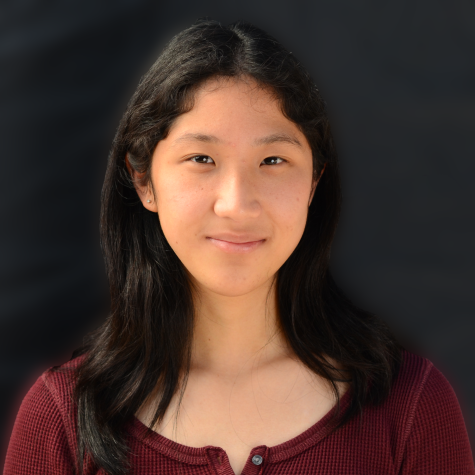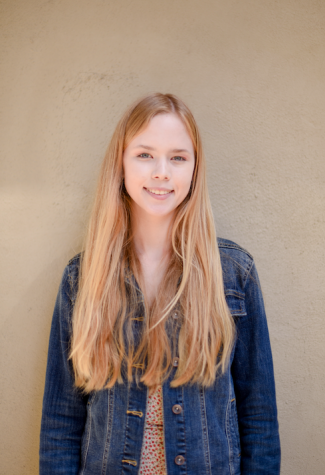AP U.S. Government and Politics holds mock primary elections
AP Government student Riva Saksena helps Shray Alag (11) turn in his ballot during fifth period on Monday. Students were able to cast their ballot for presidential candidates from all parties as well as vote on California’s Proposition 13, which regulates funding for education.
March 4, 2020
The AP U.S. Government and Politics classes held the 2020 Harker Primary elections on Monday ahead of California primary elections this Tuesday, which allows students of all grades to participate in mock elections that mimicked real life polling stations.
After setting up in the morning in upper school history and social science teacher Carol Green’s room, students could vote throughout the day. The mock primary elections were monitored by AP Government students, who signed up for shifts during office hours and lunch. Voting also proceeded during Period 5 and 7, though stations were closed during Period 6.
Students were able to cast their ballot for presidential candidates from all parties as well as vote on California’s Proposition 13, which regulates funding for education. Affirmation of this proposition would allow the state to sell general obligation bonds, which are used to fund public projects without profit, in order to back school initiatives.
If anyone was unfamiliar with the questions on the ballot, AP Government students provided clarifications as well as handed out the ballots along with secrecy folders, which prevented others from looking at the vote. After filling out their answers behind the poll stations, which were separated by dividers, students dropped in their ballots and were offered “I voted” stickers.
Out of the 282 students who voted, 64 voted for Bernie Sanders, 36 for Elizabeth Warren, 31 for Joe Biden, 25 for Michael Bloomberg, 22 for Andrew Yang, 19 for Pete Buttigieg, 10 for Donald Trump and 14 among eight other candidates.

Jessie Wang (12), adorned in a patriotic hat, turns in his ballot during the mock primaries. The majority of students voted for Bernie Sanders, while Elizabeth Warren and Joe Biden trailed behind.
“I voted for Bernie probably because I agree with a lot of his [stances],” Vaishnavi Murari (11) said. “I definitely feel really strongly about health care and gun control and climate change especially because these are some of the most important issues. They’re really big problems that I don’t think we’re doing enough to address.”
For AP Government student Amanda Cheung (12), the mock primaries act as a measure of political awareness among the community, since most students will not be eligible to vote yet.
“Actually seeing the community doing something that other people in real life do is really cool,” Amanda said. “I hope it gives people the incentive to want to go out and vote in the real world because hopefully it’s interesting to them to see how adults actually function.”


















![“[Building nerf blasters] became this outlet of creativity for me that hasn't been matched by anything else. The process [of] making a build complete to your desire is such a painstakingly difficult process, but I've had to learn from [the skills needed from] soldering to proper painting. There's so many different options for everything, if you think about it, it exists. The best part is [that] if it doesn't exist, you can build it yourself," Ishaan Parate said.](https://harkeraquila.com/wp-content/uploads/2022/08/DSC_8149-900x604.jpg)




![“When I came into high school, I was ready to be a follower. But DECA was a game changer for me. It helped me overcome my fear of public speaking, and it's played such a major role in who I've become today. To be able to successfully lead a chapter of 150 students, an officer team and be one of the upperclassmen I once really admired is something I'm [really] proud of,” Anvitha Tummala ('21) said.](https://harkeraquila.com/wp-content/uploads/2021/07/Screen-Shot-2021-07-25-at-9.50.05-AM-900x594.png)







![“I think getting up in the morning and having a sense of purpose [is exciting]. I think without a certain amount of drive, life is kind of obsolete and mundane, and I think having that every single day is what makes each day unique and kind of makes life exciting,” Neymika Jain (12) said.](https://harkeraquila.com/wp-content/uploads/2017/06/Screen-Shot-2017-06-03-at-4.54.16-PM.png)








![“My slogan is ‘slow feet, don’t eat, and I’m hungry.’ You need to run fast to get where you are–you aren't going to get those championships if you aren't fast,” Angel Cervantes (12) said. “I want to do well in school on my tests and in track and win championships for my team. I live by that, [and] I can do that anywhere: in the classroom or on the field.”](https://harkeraquila.com/wp-content/uploads/2018/06/DSC5146-900x601.jpg)
![“[Volleyball has] taught me how to fall correctly, and another thing it taught is that you don’t have to be the best at something to be good at it. If you just hit the ball in a smart way, then it still scores points and you’re good at it. You could be a background player and still make a much bigger impact on the team than you would think,” Anya Gert (’20) said.](https://harkeraquila.com/wp-content/uploads/2020/06/AnnaGert_JinTuan_HoHPhotoEdited-600x900.jpeg)

![“I'm not nearly there yet, but [my confidence has] definitely been getting better since I was pretty shy and timid coming into Harker my freshman year. I know that there's a lot of people that are really confident in what they do, and I really admire them. Everyone's so driven and that has really pushed me to kind of try to find my own place in high school and be more confident,” Alyssa Huang (’20) said.](https://harkeraquila.com/wp-content/uploads/2020/06/AlyssaHuang_EmilyChen_HoHPhoto-900x749.jpeg)












